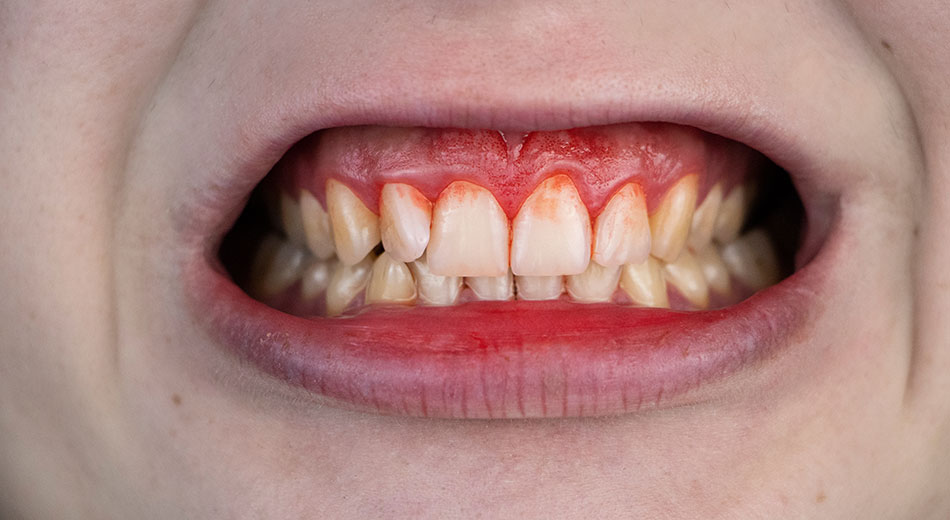Gum disease is a common condition affecting millions of Americans. According to the CDC, one out of every two adult Americans has some form of periodontal (gum) disease. It’s often not noticed until you see a dentist for an oral examination.
Oral hygiene isn’t just about keeping your teeth healthy; it’s about maintaining good overall health. A neglected mouth can cause severe issues for your entire body. And right now, we’re facing an unprecedented global crisis. It’s not something you want to risk.
When plaque and tartar build up, they cause gingivitis, leading to periodontal disease. Periodontal disease causes teeth to fall out and results in chronic inflammation.
Adults under 30 rarely show any signs of gum disease because the early stages of gum disease are often painless. However, adults between the ages of 30 and 40 typically start showing signs of gum disease.
Signs of a gum problem
- Bad breath
- Red or inflamed gums
- Bleeding gums
- Pain when chewing
- Loose teeth
- Sensitive teeth
- Receding gums
Gingivitis or Periodontal disease is caused by bacterial plaque build-up on teeth. It causes redness and swelling around your gums and may cause bleeding if not treated. You should see your dentist regularly to prevent further damage.
Heart disease
Inflammation is our body’s enemy. When the body attacks healthy cells, chronic inflammation becomes a problem. This is also the cause of why gum disease is related to heart disease.
Poor oral health can increase your risk for cardiovascular disease by three times.
Gum diseases negatively affect hypertensives’ blood pressure and interfere with antihypertensive drugs’ effectiveness.
A study by researchers at the University of Pennsylvania School of Dental Medicine found that periodontal disease increases a person’s risk of having a heart attack by 49 percent.
At Crisafulli Dental, we encourage our patients to visit us regularly so they can keep an eye out for any signs of gum disease. We want them to know the risks associated with gum diseases and how to prevent and treat them.
Diabetes
Sugar feeds bacteria, so high sugar levels in the body fuel bacteria to attack the teeth and gum tissue. Periodontal disease causes high blood sugar levels, increasing your chances of developing type two diabetes.
How does gum disease affect blood sugar levels?
When bacteria enter the bloodstream through gum disease, they trigger an increase in blood sugar levels to defend against them.
Because chronic inflammation is associated with periodontal diseases, blood sugar levels can become difficult to control among people with diabetes. Diabetes can also make it harder for the body to fight against infections such as gum disease, which may lead to tooth loss.
Rheumatoid arthritis
Bacteria called Aggregatibacteina actinomycetes are found in both gingivitis and rheumatoid arthritic patient. It causes the inflammatory autoimmune response of the body’s defense systems making the immune system proteins overactive. Thus, causing joint inflammations.
Alzheimer’s disease
According to this study, gum disease may be associated with an increased risk of Alzheimer’s. P. gingivitis bacteria in gum disease has been found in the brains of Alzheimer’s patients.
Alzheimer’s disease is a neurodegeneration disease that affects five million Americans. It starts with memory loss and gets worse over time. Experts warn that to prevent complications like Alzheimer’s disease, prevention is paramount because the bacteria from gum disease have a lot of tendencies to invade the body.
Pneumonia
Chronic lung diseases are another set of illnesses caused by chronic inflammation with gum infections. According to the American Lung Association, the condition in the mouth causes the immune system to remain on high alert and ensures a body-wide inflammation.
Chronic inflammation in gum disease patients increases their chances of getting infected with SARS-CoV-3 and suffering from its worst consequences.
If you want to prevent gum disease from putting you (and others) at risk of coronavirus, follow these tips.
Getting regular checkups from a dentist is essential, but having an appointment with a dentist immediately if you notice any gum disease is even better.
Gum disease has no symptoms until it reaches advanced stages, so be mindful of its silent onset and schedule an appointment with your dentist immediately. Gum disease can only be managed like periodontal disease. So when you brush and floss, remember that you’re brushing and flossing for both your mouth and body.




